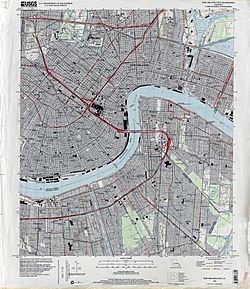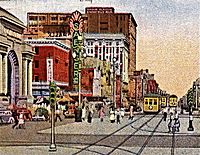Saenger Theatre (New Orleans) facts for kids
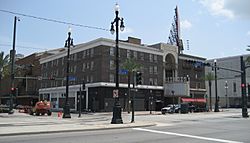
Exterior of venue (c.2007)
|
|
| Address | 1111 Canal St New Orleans, Louisiana 70112-2625 |
|---|---|
| Location | French Quarter |
| Owner | Canal Street Development Corporation |
| Operator | Ambassador Theatre Group |
| Capacity | 2,600 |
| Construction | |
| Broke ground | 1924 |
| Opened | February 4, 1927 |
| Renovated | 1978-80, 2009-11 |
| Construction cost | $2.5 million ($42.7 million in 2022 dollars ) |
| Architect | Emile Weil |
|
Saenger Theatre
|
|
| Architect | Emile Weil |
| Architectural style | Italian Renaissance |
| NRHP reference No. | 77000676 |
| Added to NRHP | November 25, 1977 |
The Saenger Theatre is a special kind of movie theater in downtown New Orleans, Louisiana. It's so important that it's listed on the National Register of Historic Places. This theater was once the most important one for Julian and Abe Saenger, who owned many theaters. Today, it's one of the few Saenger movie palaces still standing.
Contents
A Look at the Saenger Theatre's History
Opening Day and Early Years
The Saenger Theatre first opened its doors on February 4, 1927. It took three years to build and cost $2.5 million. When it opened, thousands of people celebrated along Canal Street. A ticket cost only 65 cents. Each show included a silent movie, a live play, and music from the Saenger Grand Orchestra.
The architect, Emile Weil, designed the inside to look like an Italian Baroque courtyard. He put 150 lights in the ceiling to look like stars in the night sky. The theater also had special machines. These machines could project images of moving clouds, sunrises, and sunsets onto the walls.
In 1929, Julian Saenger sold the theater for $10 million. The new owners, Paramount Publix, kept the theater running well even during the Great Depression. By 1933, the Saenger Theatre showed only "talking pictures," which are movies with sound.
Becoming a Historic Landmark
In 1964, the Saenger Theatre was changed to have two smaller theaters inside. A wall was built in front of the balcony to divide the space. The upstairs theater was called the Saenger Orleans. On September 29, 1977, the city of New Orleans named the theater a National Historic Landmark. In December of that year, it was added to the National Register of Historic Places.
First Renovation and Reopening
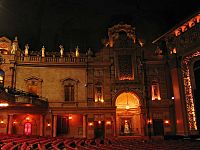
In 1978, the theater was sold again for a little over $1 million. The new owner and his partners spent an extra $3 million to fix it up. They wanted to turn it into a place for live performances.
The Saenger Theatre reopened in 1980. It now had 2,736 seats. Famous comedian Johnny Carson performed at the grand reopening. The Saenger hosted many different events. These included concerts, theater shows, and even old silent films with live orchestras. In 1983, the band Styx recorded a live album and concert film there. In 1985, a group of 50 partners bought the theater.
In the summer of 2002, the Saenger Theatre showed three classic movies. These were Some Like It Hot, The Wizard of Oz, and Gone with the Wind. This celebrated its 75th anniversary. Showing classic movies became a yearly event for the next three years.
Impact of Hurricane Katrina
When Hurricane Katrina hit New Orleans in 2005, the Saenger Theatre was badly damaged by water. The water level reached about a foot above the stage. The basement and the seating area were filled with water. Luckily, the theater was already being renovated. All the carpets and seats had been removed, so they were not ruined. The old Robert Morton Wonder Organ on the stage was damaged. The theater's offices and ticket booth also had a lot of water damage.
Second Major Renovation
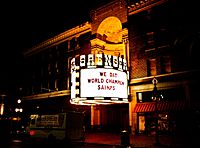
In early 2009, New Orleans officials announced a plan to fix the Saenger Theatre. A city agency would own it and lease it to the Saenger Theatre Partnership for 52 years. The partnership agreed to host at least 80 shows and sell 100,000 tickets each year. This special agreement helped get $15 million in government money and private funding. The total cost for this restoration was $38.8 million.
A main goal of this restoration was to make the Saenger look like it did when it first opened. Workers removed old paint to find the original colors. They used old photos to match doors, lights, and windows. An escalator was removed, and the main entrances were moved back to their original spots. New marquees, like the old ones, were put up. The renovation also added modern updates. The building next door was used for a restaurant, restrooms, and ticket offices. The stage was made 40% bigger. Central air conditioning was added. The ceiling's famous constellation lights were replaced with new LED lights. All the work followed strict rules for preserving historic buildings.
The theater's marquee was lit up again in October 2009. This showed that the Saenger Theatre was coming back to life. It was announced that the marquee would stay lit every night until the theater reopened.
Restoration work began in early 2010. A new website was launched. Broadway Across America announced that The Lion King musical would play at the Saenger. Construction was scheduled to begin in July 2010.
Although the project was set to start in July 2010, construction had not begun by March 2011. It was then announced that the Saenger would not be ready until at least the 2012-2013 Broadway season.
In December 2011, New Orleans officials said all financial issues were solved. Construction on the $51 million renovation began in January 2012.
The Saenger Theatre finally reopened on September 27, 2013. Comedian Jerry Seinfeld performed three shows. The grand opening celebration was held from October 3-6. The National Trust for Historic Preservation called the Saenger one of ten historic sites saved in 2013. The final cost of the renovation was $53 million.
The Saenger Theatre Organ
The Saenger Theatre has a very special theatre organ with about 2,000 pipes. It was installed when the theater first opened. This organ is one of the largest ever built by the Robert Morton Organ Company. It was a test model for their "Wonder Morton" line of organs. The organ has a four-manual console and 26 ranks of pipes. Nine of these ranks extend to a very low 16-foot pitch. It was designed especially for the sound of the Saenger. It is one of the few Robert Morton organs in the United States still in its original home. A famous theater organist named Jesse Crawford once said the Saenger's Morton organ was the best he had ever played.
See also
- List of concert halls
- List of music venues
- Theatre in Louisiana
- Saenger Theatre (Mobile, Alabama)
- Saenger Theatre (Pensacola, Florida)
 | Bessie Coleman |
 | Spann Watson |
 | Jill E. Brown |
 | Sherman W. White |


